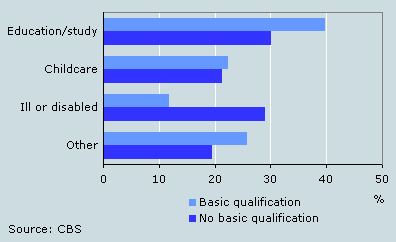Fewer youngsters without a basic qualification employed

One quarter of youngsters who had left school without a basic qualification were not active on the labour market in 2006: they did not have and were not looking for a job. This is twice as many as those who did have a basic qualification.
Labour participation of 15-24 year-olds not in education, 2006

No qualification: one in four not employed
Of all the 15-24 year-olds no longer in education in 2006, 235 thousand did not have a basic qualification; their highest diploma was lower than senior vocational training level 2 (MBO 2), or they had dropped out of school without a diploma at all. Twenty-five percent of this group was not active on the labour market, compared with only 11 percent of those who did have a basic qualification.
Reason not to work, or not wanting to work, 2004/2006

More disabled among non-active without a qualification
Some of the unemployed youngsters did want to work but were not looking for a job or were not in a position to start work in the short term. However, most of them, some 60 percent, did not want to or were not able to work. Illness or disablement important reasons in this respect. This was the case for 29 percent of the youngsters with no basic qualification. For those with a basic qualification this was only 12 percent. One contributing factor to this was that young people with a long-term disability are more likely not to have a basic qualification: 58 percent of young people with a disability, compared with 38 percent of people without a disability.
Childcare was a reason for one fifth of young people – nearly all women – with or without a basic qualification for not working to not wanting to work. Education/study was mentioned by one third of young people as a reason not to work. These are young people who had interrupted their education or were doing a course.
Harry Bierings and Robert de Vries